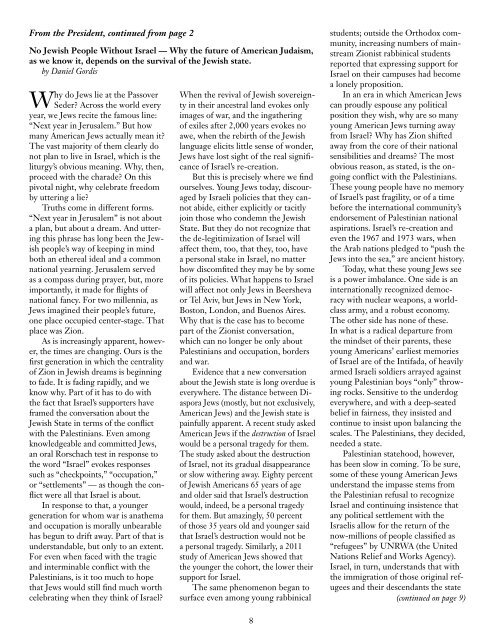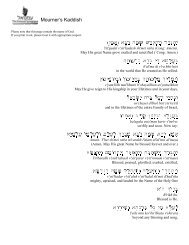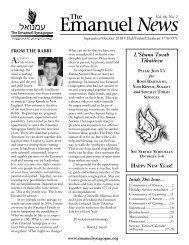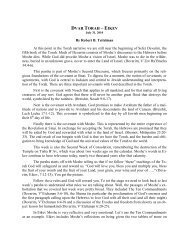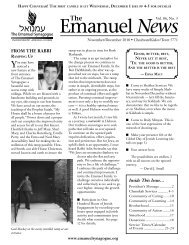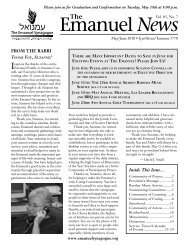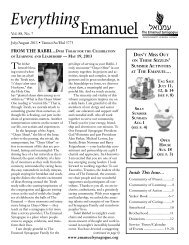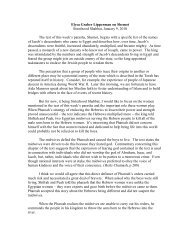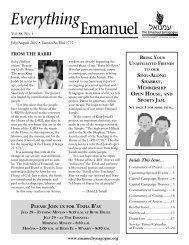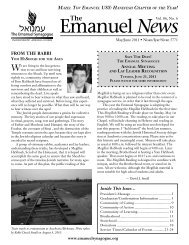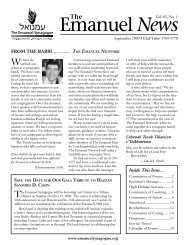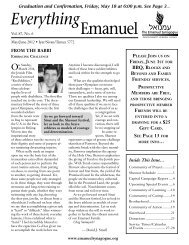Everything Emanuel March-April 2013 - The Emanuel Synagogue
Everything Emanuel March-April 2013 - The Emanuel Synagogue
Everything Emanuel March-April 2013 - The Emanuel Synagogue
Create successful ePaper yourself
Turn your PDF publications into a flip-book with our unique Google optimized e-Paper software.
From the President, continued from page 2<br />
No Jewish People Without Israel — Why the future of American Judaism,<br />
as we know it, depends on the survival of the Jewish state.<br />
by Daniel Gordis<br />
Why do Jews lie at the Passover<br />
Seder? Across the world every<br />
year, we Jews recite the famous line:<br />
“Next year in Jerusalem.” But how<br />
many American Jews actually mean it?<br />
<strong>The</strong> vast majority of them clearly do<br />
not plan to live in Israel, which is the<br />
liturgy’s obvious meaning. Why, then,<br />
proceed with the charade? On this<br />
pivotal night, why celebrate freedom<br />
by uttering a lie?<br />
Truths come in different forms.<br />
“Next year in Jerusalem” is not about<br />
a plan, but about a dream. And uttering<br />
this phrase has long been the Jewish<br />
people’s way of keeping in mind<br />
both an ethereal ideal and a common<br />
national yearning. Jerusalem served<br />
as a compass during prayer, but, more<br />
importantly, it made for flights of<br />
national fancy. For two millennia, as<br />
Jews imagined their people’s future,<br />
one place occupied center-stage. That<br />
place was Zion.<br />
As is increasingly apparent, however,<br />
the times are changing. Ours is the<br />
first generation in which the centrality<br />
of Zion in Jewish dreams is beginning<br />
to fade. It is fading rapidly, and we<br />
know why. Part of it has to do with<br />
the fact that Israel’s supporters have<br />
framed the conversation about the<br />
Jewish State in terms of the conflict<br />
with the Palestinians. Even among<br />
knowledgeable and committed Jews,<br />
an oral Rorschach test in response to<br />
the word “Israel” evokes responses<br />
such as “checkpoints,” “occupation,”<br />
or “settlements” — as though the conflict<br />
were all that Israel is about.<br />
In response to that, a younger<br />
generation for whom war is anathema<br />
and occupation is morally unbearable<br />
has begun to drift away. Part of that is<br />
understandable, but only to an extent.<br />
For even when faced with the tragic<br />
and interminable conflict with the<br />
Palestinians, is it too much to hope<br />
that Jews would still find much worth<br />
celebrating when they think of Israel?<br />
When the revival of Jewish sovereignty<br />
in their ancestral land evokes only<br />
images of war, and the ingathering<br />
of exiles after 2,000 years evokes no<br />
awe, when the rebirth of the Jewish<br />
language elicits little sense of wonder,<br />
Jews have lost sight of the real significance<br />
of Israel’s re-creation.<br />
But this is precisely where we find<br />
ourselves. Young Jews today, discouraged<br />
by Israeli policies that they cannot<br />
abide, either explicitly or tacitly<br />
join those who condemn the Jewish<br />
State. But they do not recognize that<br />
the de-legitimization of Israel will<br />
affect them, too, that they, too, have<br />
a personal stake in Israel, no matter<br />
how discomfited they may be by some<br />
of its policies. What happens to Israel<br />
will affect not only Jews in Beersheva<br />
or Tel Aviv, but Jews in New York,<br />
Boston, London, and Buenos Aires.<br />
Why that is the case has to become<br />
part of the Zionist conversation,<br />
which can no longer be only about<br />
Palestinians and occupation, borders<br />
and war.<br />
Evidence that a new conversation<br />
about the Jewish state is long overdue is<br />
everywhere. <strong>The</strong> distance between Diaspora<br />
Jews (mostly, but not exclusively,<br />
American Jews) and the Jewish state is<br />
painfully apparent. A recent study asked<br />
American Jews if the destruction of Israel<br />
would be a personal tragedy for them.<br />
<strong>The</strong> study asked about the destruction<br />
of Israel, not its gradual disappearance<br />
or slow withering away. Eighty percent<br />
of Jewish Americans 65 years of age<br />
and older said that Israel’s destruction<br />
would, indeed, be a personal tragedy<br />
for them. But amazingly, 50 percent<br />
of those 35 years old and younger said<br />
that Israel’s destruction would not be<br />
a personal tragedy. Similarly, a 2011<br />
study of American Jews showed that<br />
the younger the cohort, the lower their<br />
support for Israel.<br />
<strong>The</strong> same phenomenon began to<br />
surface even among young rabbinical<br />
students; outside the Orthodox community,<br />
increasing numbers of mainstream<br />
Zionist rabbinical students<br />
reported that expressing support for<br />
Israel on their campuses had become<br />
a lonely proposition.<br />
In an era in which American Jews<br />
can proudly espouse any political<br />
position they wish, why are so many<br />
young American Jews turning away<br />
from Israel? Why has Zion shifted<br />
away from the core of their national<br />
sensibilities and dreams? <strong>The</strong> most<br />
obvious reason, as stated, is the ongoing<br />
conflict with the Palestinians.<br />
<strong>The</strong>se young people have no memory<br />
of Israel’s past fragility, or of a time<br />
before the international community’s<br />
endorsement of Palestinian national<br />
aspirations. Israel’s re-creation and<br />
even the 1967 and 1973 wars, when<br />
the Arab nations pledged to “push the<br />
Jews into the sea,” are ancient history.<br />
Today, what these young Jews see<br />
is a power imbalance. One side is an<br />
internationally recognized democracy<br />
with nuclear weapons, a worldclass<br />
army, and a robust economy.<br />
<strong>The</strong> other side has none of these.<br />
In what is a radical departure from<br />
the mindset of their parents, these<br />
young Americans’ earliest memories<br />
of Israel are of the Intifada, of heavily<br />
armed Israeli soldiers arrayed against<br />
young Palestinian boys “only” throwing<br />
rocks. Sensitive to the underdog<br />
everywhere, and with a deep-seated<br />
belief in fairness, they insisted and<br />
continue to insist upon balancing the<br />
scales. <strong>The</strong> Palestinians, they decided,<br />
needed a state.<br />
Palestinian statehood, however,<br />
has been slow in coming. To be sure,<br />
some of these young American Jews<br />
understand the impasse stems from<br />
the Palestinian refusal to recognize<br />
Israel and continuing insistence that<br />
any political settlement with the<br />
Israelis allow for the return of the<br />
now-millions of people classified as<br />
“refugees” by UNRWA (the United<br />
Nations Relief and Works Agency).<br />
Israel, in turn, understands that with<br />
the immigration of those original refugees<br />
and their descendants the state<br />
(continued on page 9)<br />
8


